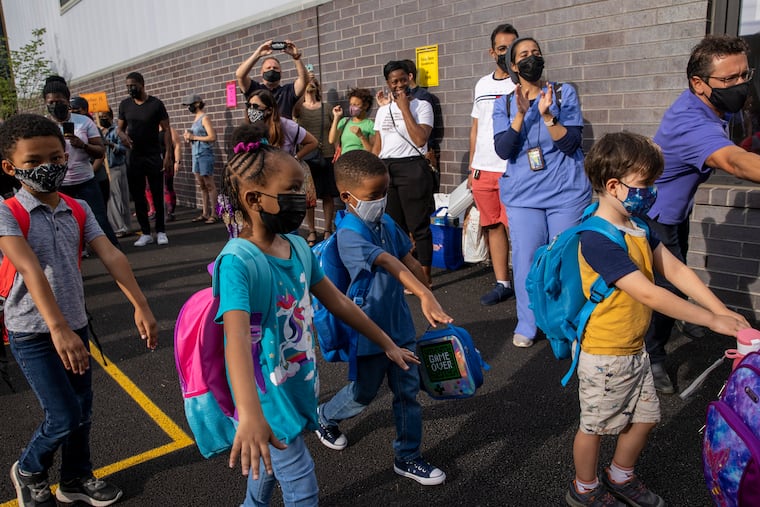Philly’s ‘just good enough’ approach toward our kids is a public health failure | Opinion
The return to school brings more change under COVID-19, but also more of the disappointing same.

Could there have been a more highly anticipated back-to-school week than this year’s? After the experience of virtual schooling for the vast majority of children across the Philadelphia region since March 2020, children and parents alike were anxious and eager to physically step back into school as their whole selves, not just a Zoom headshot.
Just days before the Aug. 31 start day, parents in schools across the district learned of issues ranging from inconveniences to major safety concerns: porta-potty alternatives due to incomplete bathroom construction, asbestos risks, and other building issues. Parents were reassured that the physical structures of our schools were good enough to serve Philly’s children. Communications came from the School District explaining that minimum standards had been met to address these issues. It left many of us wondering how the unprecedented opportunity of completely empty school buildings for 18 months was not fully exploited to tackle repairs and rehab that have been needed for decades.
When will we decide that just good enough is far from adequate for our children and their future? When will we recognize that offering them anything less than modern resources is a public health failure?
» READ MORE: Philly’s first week of school marred by inconsistent expectations and a lack of transparency | Opinion
As a physician and public health expert, I focus on health and wellness. Unlike adults, children face relatively few specific illnesses or physical impairments. Their health and development are largely dictated by the forces around them: their nutrition, environment, safety, and stressors. Children are most vulnerable to the decisions and behaviors of adults and systems — clearly illustrated by full or nearly full children’s hospitals in areas with low adult vaccination rates. For those too young to get a COVID-19 vaccine, their safety comes down to others’ actions, including vaccines, masks, and social distancing. Closer to home, despite a statewide mask mandate from Gov. Tom Wolf, adults continue to fight against these basic risk reduction efforts to ensure a safer return to school, putting risk squarely on their children.
But our failures for our children predate the pandemic. In 2019, the Philadelphia Department of Public Health released a first-of-its-kind report on pediatric health metrics, Growing Up Philly, detailing the numbers and what they mean for our children. Just a few key points:
Philadelphia had the highest child mortality rate of all large U.S. cities, with 71.6 deaths per 100,000 children, in 2017 — nearly 45% higher than the national rate.
Black and Hispanic children were disproportionately harmed and accounted for at least 70% in eight of the top 10 categories of child deaths, including 96% of all homicides (excluding child abuse).
Homicide was the second-leading cause of child mortality in Philadelphia.
The highest density of the population less than 18 years old was in North and Lower Northeast Philly (over 31%). The lowest density of safe parks and outdoor spaces was in the same areas.
The percentage of teens who have experienced suicidal ideation increased to 22% in 2019, highest among girls; 14.6% of teens in Philadelphia attempted suicide, the highest proportion among female Hispanic youths (16.2%).
In 2018, 34.6% of children in Philadelphia under age 18 lived in poverty, almost double the state and national levels.
Our city’s children have long been the recipients of trickle-down investment and overlooked priorities. The data show a clear negative impact — and the potential for remedy. Research published in JAMA Network Open this summer and led by another local emergency physician, Dr. Eugenia South, showed that historically segregated blocks in Philadelphia saw a 21.9% drop in violence when they benefited from the Basic Systems Repair Program, a city service that helps residents pay for roofing, plumbing, and electrical repairs in their homes. These findings are a reminder that a lack of repair and resources can cost lives, and will most certainly impede development and advancement of the children within the community.
» READ MORE: ‘We’re excited to get kids back’: The first day of school welcomes back 120,000 Philadelphia students
This idea may hold true for the systemic disrepair of our schools and systems focused on children. Our built environments and infrastructure are many decades behind where they should be and remain vulnerable to the forces of nature, such as Ida, that will continue to come. Housing and food security, education, and physical and mental safety are more critical to child development than their genetics or even access to care. While Philadelphia’s largest foundations, such as Pew, William Penn, and Knight, have supported different facets of the building blocks of child wellness, our city at large continues to focus on the short term and getting by.
When will we deliver broader and greater focused attention on our youngest, most impressionable, most vulnerable citizens who are ripe with potential and who can overcome seemingly insurmountable odds with meaningful support? The time is now to say “good enough” isn’t good enough. We can start by bringing the needs of this city’s children to the forefront instead of always relegating them to the back burner. We can demand that funding and resources from the city, state, and federal levels be utilized in equitable child and family-centered ways, starting with rehabbing all school buildings. And we can hold the adults, our leaders and elected officials, accountable for their promises. Our kids deserve the best of everything Philadelphia can offer them.
Priya E. Mammen, MD, MPH, is an emergency physician and public health specialist. She is adjunct faculty of health and societies at the University of Pennsylvania and chair of the section on public health and preventive medicine at the College of Physicians of Philadelphia.